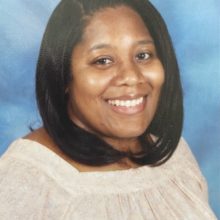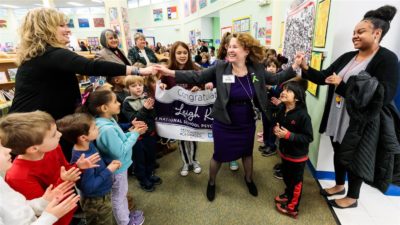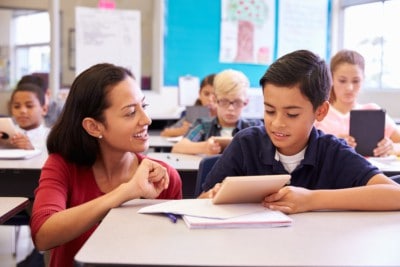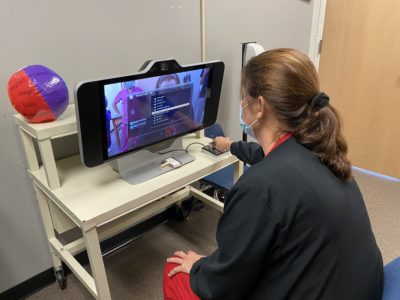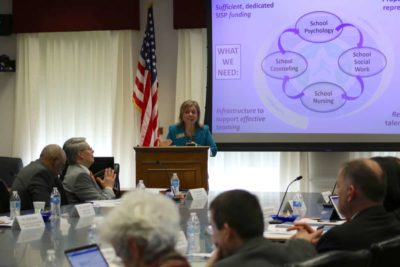

As National School Psychology Week (Nov. 9-13) came to an end, I thought about this year’s theme, The Power of Possibility. While the COVID-19 pandemic has changed how school looks for the 1.5 million public school students in North Carolina, school psychologists continued to find creative ways to connect with students to provide support and familiarity during these challenging times.
Whether providing telehealth services, creating virtual offices, assembling individual calm down kits, or thinking of various ways to engage families in virtual school, school psychologists have reimagined what service delivery looks like in order to meet the needs of North Carolina’s students and their families. For instance, at one of my schools, student services staff created a virtual classroom with various online activities that students can access throughout the day to help learn and practice self-regulation skills. Additionally, for kids who are in the process of transitioning to in-person learning, individual calm down kits with stress toys and other activities were created to reinforce self-regulation skills throughout the school day.
As I reflect on the creativity that school psychologists have tapped into as a result of the pandemic, I too think about the many barriers that have emerged. Recently, a school psychologist colleague shared a story with me that reminded me of the barriers that we help students overcome in order to embrace the many possibilities that await.
Related Readings
This school psychologist was working with a student who was struggling socially and academically at home — the same home that doubled as his “school environment” since his district was fully remote. The student’s only parent had recently died of COVID-19. As such, he moved to North Carolina to live with extended family.
Even though he logged into his classes, he did not complete independent assignments, spent a lot of his time in his room, and avoided spending time with family. His school psychologist worked with the family to help find the student a pediatrician and a local therapist. Additionally, she collaborated with school staff to set him up with a male mentor to check in with him a few times per week and used motivational strategies to help him complete work and engage with family at home.
Over time, the student was able to transition to the school building for two days per week of in-person instruction and three days of remote instruction. From week to week, his grades slowly improved, and he even began to make friends with some of his neighborhood peers. Addressing his needs from a whole child perspective worked. His school psychologist was instrumental in unlocking the power of possibility in him.
Across the state, school districts are continuing to feel the impact of the school psychologist shortage. As of 2019, 22 school districts and most charter schools in North Carolina had no full-time school psychologist. That’s hundreds of thousands of students without access to a school psychologist at a time when we are needed most. As we continue to weather the impact of the pandemic, the number of vacancies is sure to increase if we do nothing about it.
One solution is the North Carolina Forgivable Education Loans for Service (FELS). Students can apply for this loan and repay it with public service on a one-to-one exchange: one year of service as a school psychologist in a North Carolina public school means one year of loan forgiveness. Students going to college or pursuing graduate studies can start applying as soon as Dec. 7, 2020.
In spite of North Carolina’s school psychologist-to-student ratio of 1:1943 (the national recommended ratio is 1:500), we continue to use our knowledge of data-based decision making, mental health support, social emotional/academic intervention, program evaluation, and family/community collaboration to help foster resiliency, critical thinking, and social-emotional awareness in students we serve.
Recently, in my county, a new group of students transitioned back into the building. Their smiles, laughs, and excited energy felt like a breath of fresh air as they moved throughout the hallways. By incorporating techniques such as goal setting, positive thinking, praise, and perspective taking into my student counseling and classroom check-ins, students were encouraged to think about the many possibilities regarding their overall well-being and academic achievement.
While students are settling into their new normal, the skill sets of school psychologists are needed now more than ever for students and for effective teaming in schools. We have the ability to provide supports that extend beyond the classroom. As school psychologists, we are the psychologists who know the most about education, and the educators who know the most about psychology.
Reflecting on all that we continue to do to adapt to the current times, there are endless possibilities within the field of school psychology to create positive outcomes for all North Carolina students. The power of possibility is endless with North Carolina’s school psychologists.
